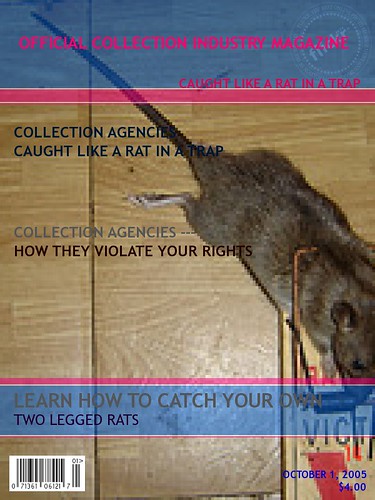Collection agencies and fraud
Collection agencies and fraud
When dealing with collection agencies, the possibility that they may have some terrorist organization connections isn't the only threat one faces. There is an even greater threat the consumer needs to be aware of and it isn't necessarily the collection agency itself but rather the very real possibility that one or more of their employees may steal your sensitive information and use it or sell it online.
This Russian website deals in stolen credit information There are many more like that in cyberspace these days. These websites operate somewhat like ebay in that stolen information is sold to the highest bidder. All that is needed is your credit or debt card number or even your checking account routing and account numbers and that information can be sold on line and then used to purchase items on line.
We are now seeing more and more news stories about data bases of various companies being hacked and the sensitive information of thousands of people being stolen. This information is being stolen from banks, insurance companies and anyplace where large amounts of private information might be stored. The criminals always use fake webpages, proxy servers to hide their IP addresses and such things as the Dingo Anonymous Remailer which was recently used to spam 120,000 newsgroups to promote a false blog.
Spamming always generates large numbers of hate emails from those who have been spammed and those emails can be sold to yet other criminals such as those who promone the Nigerian scams and other forms of pfishing attacks.
Those email addresses can also be compared to the names and addresses of people who owe money and from whom collection agencies are trying to collect. So the reasons a collection agency hack might falsely pose as a consumer advocate are many and varied.
The tip-off is the use of proxy servers and other means to hide one's identity while trying to lure unsuspecting consumers to their website.
The bottom line is that it makes no difference at all whether they are somehow connected to actual terrorist groups or donate money to them or are looking for the email addresses of indebted consumers or might be gathering information about consumers for the purposes of selling the email addresses to scammers or whatever. One should never give a debt collector any information such as checking account or debit/credit card numbers. To do that is to open ones self to all manner of scams and frauds.
creditwrench-thetruth.blogspot.com is the blog of a known and proven scammer who uses
every known pfishing trick such as anonymous remailers, proxy servers and many more to gather private information about people for whatever illicit purpose the scammer might have in mind.
pcmholdings.com is his base of operations and is also the home of various and sundry crackpots, perverts and other despicable types.
Today, even paying bills on line can be dangerous and get you into trouble. Creditwrench recommends that you never do that no matter how convenient it may be.
If you are going to pay a bill that you owe you should only do so by phone or by U.S. Mail and if you are going to pay a bill by phone be sure that you are the one who has initiated the call, not the other party.
Don't ever fall for paying a debt collector over the phone. You might regret having done that a lot. Make them give you a mailing address and then send them a certified bank cashier's check and never a check from your personal account and be sure to send it certified mail, return receipt requested. Be sure that you have photocopies of that check you send even if it is in partial payment.
If you are being bugged to death on the phone you can use these 18 questions to put a stop to it. They will put an end to harassing phone calls within 3 or 4 calls max. After that you won't be getting bugged to death by them anymore.
You should also learn how to pay off your debts the safe way. This method can only be used when paying them in full. If you have been making payments to a debt collector then you can use it on the final check you send them. If you attempt to use it to defraud them in any way then it will not work. If you are going to pay them at all then you need to have a means whereby they will have to take it off your credit reports instead of leaving it there for the full 7 plus years allowable by law or more if they can get away with it.












